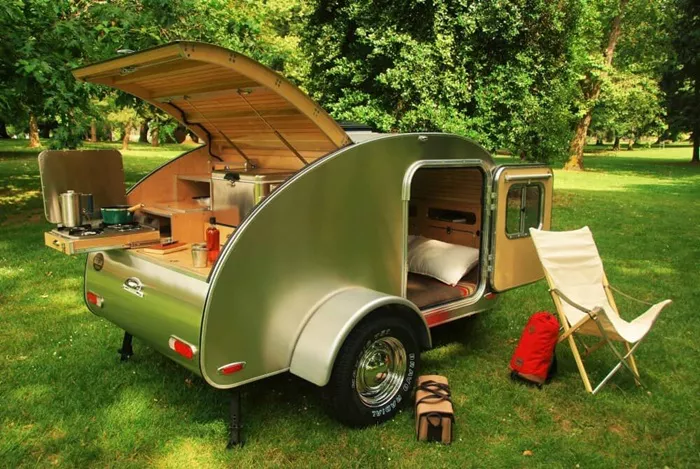Wheeled campers, also known as camping trailers or caravanettes, are a popular choice for outdoor enthusiasts. They offer comfort, convenience, and mobility. Unlike traditional tents, these units come with wheels, making them easy to tow. Whether you’re a weekend warrior or a full-time nomad, a wheeled camper can enhance your camping experience.
In this guide, we’ll explore different types, features, and benefits. We’ll also discuss maintenance tips and how to choose the best model for your needs.
Types of Wheeled Campers
1. Travel Trailers
Travel trailers are the most common type. They come in various sizes, from compact teardrop models to large family-sized units. These campers require a tow vehicle, such as an SUV or truck.
Pros:
- Spacious interiors
- Many floor plans available
- Affordable compared to motorhomes
Cons:
- Need a powerful tow vehicle
- Can be difficult to maneuver
2. Pop-Up Campers (Folding Trailers)
Pop-up campers are lightweight and easy to tow. They expand when set up, offering more space. These are great for casual campers who want a balance between tent camping and RV comfort.
Pros:
- Lightweight and fuel-efficient
- Easy to store
- More affordable than hard-shell trailers
Cons:
- Less insulation in extreme weather
- Takes time to set up and pack down
3. Fifth-Wheel Trailers
Fifth-wheel trailers attach to a pickup truck using a special hitch in the truck bed. They are larger and often include luxury features.
Pros:
- Spacious with multiple rooms
- Stable towing experience
- High-end amenities available
Cons:
- Requires a heavy-duty truck
- Expensive to buy and maintain
4. Toy Haulers
Toy haulers are designed for adventure seekers. They have a garage space for ATVs, motorcycles, or other gear.
Pros:
- Great for outdoor sports
- Versatile storage options
- Often include fold-down beds or living spaces
Cons:
- Heavier than standard trailers
- Can be pricey
Key Features to Look For
1. Size and Weight
Choose a camper that matches your vehicle’s towing capacity. Overloading can be dangerous.
2. Sleeping Capacity
Consider how many people will sleep inside. Some models have bunk beds or convertible dinettes.
3. Kitchen and Bathroom Facilities
Many wheeled campers include:
- Small kitchens with stoves and sinks
- Compact bathrooms with showers and toilets
4. Storage Options
Look for exterior compartments, overhead cabinets, and under-bed storage.
5. Off-Road Capability
If you plan to camp in rugged areas, choose a model with reinforced suspension and all-terrain tires.
Benefits of Wheeled Campers
1. Comfort in All Weather
Unlike tents, wheeled campers provide insulation, heating, and air conditioning.
2. Easy Setup
Most models require minimal setup—just park, level, and connect utilities.
3. Cost-Effective Travel
They are cheaper than motorhomes and save money on hotels.
4. Freedom to Explore
You can move between campsites without packing up entirely.
Maintenance Tips
1. Regular Inspections
Check tires, brakes, and lights before each trip.
2. Clean and Dry Storage
Prevent mold by airing out the camper after use.
3. Winterizing
If storing in cold weather, drain water systems to avoid freezing damage.
4. Battery Care
Keep batteries charged and check connections.
How to Choose the Right Wheeled Camper
1. Determine Your Budget
Prices range from 5,000 for basic models to over 50,000 for luxury units.
2. Assess Your Towing Vehicle
Make sure your car or truck can handle the weight.
3. Consider Your Camping Style
- Solo travelers may prefer a teardrop trailer.
- Families might need a bunkhouse model.
4. Test Drive (If Possible)
Some dealers offer rentals—try before you buy.
Conclusion
Wheeled campers provide a perfect mix of adventure and comfort. Whether you want a simple pop-up or a luxurious fifth-wheel, there’s a model for every need. By understanding the different types, features, and maintenance requirements, you can make an informed choice.
Happy camping!
Related topics:
Best Instant Canopy for Camping: A Detailed Guide
Best Bags for Summer Camp: A Detailed Guide
The 5 Best Shade Canopies for Camping

